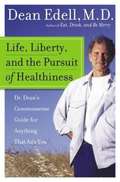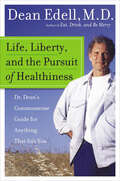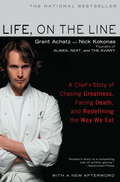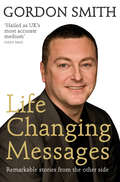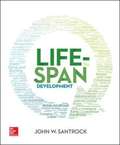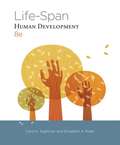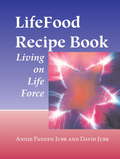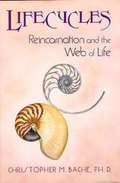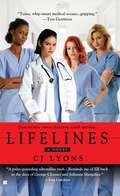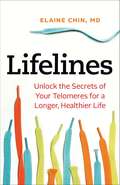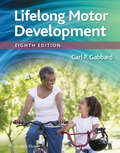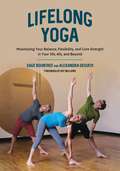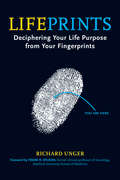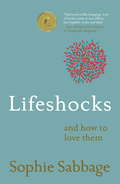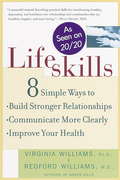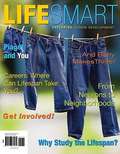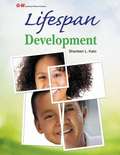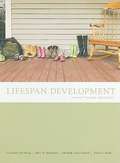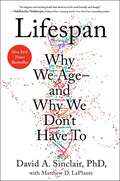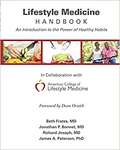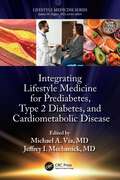- Table View
- List View
Life, Liberty, and the Pursuit of Healthiness
by Dean Edell Melissa HoutteHere is your guide through the media hype, direct to the bottom line. Whether you're interested in advice on sex health, arthritis, or how to spot medical myths, you will see why millions of Americans have come to revere Dr. Dean. His refreshingly candid health talk on radio and television, and in the bestsellingEat, Drink, and Be Merry is just like Grandma's advice: practical and enlivened with a strong dose of opinion. Life, Liberty, and the Pursuit of Healthiness is a comprehensive medical resource for the whole family, applying Dr. Dean's practical health philosophies to today's most pressing health topics-from attention deficit hyperactivity disorder to obesity, depression, and the effectiveness of alternative medicines. This book features more than 500 questions and answers from Dr. Dean's popular radio show, plus quizzes, symptom checklists, Web links, and recommended reading. You'll also find plenty of often-surprising facts, debunked "truths," and critical details from the latest medical research. This is the book you'll want on your nightstand, for your family's good health. Dr. Dean has answered more than 50,000 questions on the air in the last twenty-five years. In Life, Liberty, and the Pursuit of Healthiness, he encourages readers to take charge of their own health with their most powerful weapons-common sense and a dose of skepticism-saving time, money, and especially anxiety. Dr. EDELL, M.D., probably has the largest medical practice in the United States-his hugely popular radio and television broadcasts are heard by more than ten million fans every week. A graduate of Cornell University Medical College and the author of the national bestseller Eat, Drink, and Be Merry; he lives in the San Francisco Bay Area. www.drdean.healthcentral.com
Life, Liberty, and the Pursuit of Healthiness: Dr. Dean's Commonsense Guide for Anything That Ails You
by Dean EdellAmerica is in a chronic state of confusion and anxiety about matters ofhealth. Each day, we are bombarded with news of medical breakthroughs,wonder drugs, and hidden dangers. Now author and radio host Dr. DeanEdell clears things up with this at-home medical resource that squarelyconfronts more than five hundred common health concerns, including:The skinny on fat, carbs, Atkins, and XenicalSex, with a look at Viagra, orgasms, chlamydia, and HPV"Alternative medicine" and the myths of herbs, essential oils,and supplementsWomen's issues, from fertility to breast-feeding to fibroidsBotox, breast implants, and the business of beautyInfectious diseases, from the common cold to the WestNile virusCancer—breast, colon, prostate—and advances in earlyscreening and treatmentAddictions, including coffee, booze, grass, Vicodin, and PaxilContaining quizzes, symptom checklists, web links, and recommendedreading lists, this invaluable guide will help you take charge of your ownhealth, save time and money, and alleviate anxiety over health issues today.
Life, on the Line: A Chef's Story of Chasing Greatness, Facing Death, and Redefining the Way We Eat
by Grant Achatz Nick Kokonas"One of America's great chefs" (Vogue), Grant Achatz, shares how his drive to cook immaculate food fueled his miraculous triumph over tongue cancer. By 2007 chef Grant Achatz had been named one of the best new chefs in America by Food & Wine, he had received the James Beard Foundation Rising Star Chef of the Year Award, and he and Nick Kokonas had opened the conceptually radical restaurant Alinea, which was named Best Restaurant in America by Gourmet magazine. Then, positioned firmly in the world's culinary spotlight, Achatz was diagnosed with stage IV squamous cell carcinoma-tongue cancer.The prognosis grim, Grant undertook an alternative treatment of aggressive chemotherapy and radiation that ravaged his body and left him without a sense of taste. Tapping into his profound discipline and passion, he trained his chefs to mimic his palate and learned how to cook with his other senses. As Kokonas was able to attest, the food was never better. Five months later, Grant was declared cancer-free and went on to achieve some of the highest honors in the culinary world. Life, on the Line is not only a chef's memoir, it is also a book about survival, about nurturing creativity, and about profound friendship.
Life-Changing Messages: Remarkable Stories From The Other Side
by Gordon SmithThe messages that Gordon has conveyed to people from friends and relatives in the Spirit world have had a profound impact on their lives. Learning that death is not the ultimate and final end that we fear is a powerful catalyst to changing the way that we view our lives. This gripping book is full of extraordinary personal accounts from a wide range of people, including many high-profile celebrities. They describe the profound and life-changing messages that have reassured, challenged and inspired them. Gordon himself is often profoundly affected by the messages he shares with people and in this moving and engaging book he describes the messages that he has received that have altered his view of the world.
Life-Span Development (15th Edition)
by John W. SantrockThe book intends to provide students with the best and most recent theory and research in the world today about each of the periods of the human life span and guide them in making developmental connections across different points in the human life span.
Life-Span Human Development (Eighth Edition)
by Carol K. Sigelman Elizabeth A. RiderKnown for its clear, straightforward writing style, comprehensive coverage, strong and current research-based approach, and excellent visuals and tables, this life-span development text offers a topical organization at the chapter level and a consistent chronological presentation within each chapter. Each chapter focuses on a domain of development such as physical growth, cognition, or personality, and traces developmental trends and influences in that domain from infancy to old age. Within each chapter, you will find sections on four life stages: infancy, childhood, adolescence, and adulthood. This unique organization enables students to comprehend the processes of transformation that occur in key areas of human development. Another staple of the text is its emphasis on theories and how they apply to specific topics in each chapter. This new edition also asks students to engage more actively with the content, and includes a clear focus on the complex interactions of nature and nurture in development, more integrated coverage of culture and diversity, and an exciting new media package for both students and instructors.
Life-Span Human Development (Ninth Edition)
by Carol K. Sigelman Elizabeth A. RiderKnown for its clear, straightforward writing style, grounding in current research, and well-chosen visuals and examples, Sigelman and Rider's text combines a topical organization at the chapter level and an age/stage organization within each chapter. Each chapter focuses on a domain of development such as physical growth, cognition, or personality and traces developmental trends and influences in that domain from infancy to old age. Each chapter also includes sections on infancy, childhood, adolescence, and adulthood. The organization helps you grasp key transformations that occur in each period of the life span. Other staples of the text are its emphasis on theories and their application to different aspects of development and its focus on the interplay of nature and nurture in development. This edition includes new research on biological and sociocultural influences on life-span development and offers new media resources that help you engage more actively with the content.
LifeFood Recipe Book
by David Jubb Annie Padden JubbLife force foods are those found wild in nature and served uncooked. A life force diet is vegetarian, and mainly vegan, congruent with the philosophy that good food choices promote a sustainable future on the planet. This book applies life food principles to daily life. The authors explain how the LifeFood diet can strengthen the mind and body, and show how to make lotions, tinctures, and potions with food. With illustrations throughout and over 150 easy to follow recipes to maximize health and well being, this book features such dishes as Aztec Quiche, Emerald Broccoli Soup, Spicy Ginger Tofu, and Pina Colada Cookies.
Lifecycles: Reincarnation and the Web of Life
by Christopher M. BacheA look at the study of philosophy, religion, and a reincarnational view of life
Lifelines
by C. J. LyonsThis book is a gripping behind-the-scenes drama of four women who face life and death every day.
Lifelines
by Elaine ChinUnlock the secrets of your telomeres for a longer, healthier life. They’re like the plastic tips of your shoelaces that keep them from fraying. But they’re at the ends of your DNA and they keep you from developing disease and dying too young. The discovery of telomeres is one of the great breakthroughs in contemporary medicine. Nobel-winning scientist Dr. Elizabeth Blackburn and her research teams have opened a world of promise when it comes to living longer and healthier. Today, we have the know-how to slow the disintegration process, to beat our biological clock, and prevent disease. Keeping your telomeres robust and as long as possible is crucial to your health. Noted physician, Dr. Elaine Chin, offers practical and realistic ways to optimize the length of your telomeres and maximize your health. Containing comprehensive information on diet and lifestyle, the potential of supplements, hormone-replacement therapy, sleep patterns, mindfulness, stress management and life purpose, Lifelines will show you how to use our knowledge of telomere science to give you an advantage in what really counts most in life--how long and how well you will live!
Lifelong Motor Development
by Carl GabbardMaster challenging motor development concepts and confidently apply them in practice in such areas as Exercise Science, Physical Therapy, and Occupational Therapy with this trusted, up-to-date, research-based text. Approaching motor development as the study of change, Lifelong Motor Development, 8th Edition, covers the field of physical growth and motor behavior across the lifespan and employs multiple theories to help you truly understand the multicausal and complex nature of motor development. Carefully updated to include the latest research and additional content, as well as the new motor assessments, this 8th edition provides engaging learning activities and enhanced resources helpful to online learning and designed to ensure students’ success in any learning environment.
Lifelong Yoga: Maximizing Your Balance, Flexibility, and Core Strength in Your 50s, 60s, and Beyond
by Roy Williams Alexandra Desiato Sage RountreeYoga offers vital tools for healthy aging: strength, flexibility, balance, and peace of mind. In this one-of-a-kind book, Sage Rountree and Alexandra DeSiato describe the poses and routines that can help keep people of any age fit and injury free. In addition to demonstrating simple ways to maintain and even increase our ability to be active into our 50s, 60s, and beyond, the authors—both yoga teachers with decades of experience—offer poses and routines aimed toward specific goals, such as improving balance, maintaining strength and flexibility, and recovering properly between workouts. Each fully illustrated sequence is introduced with a brief overview of its benefits, along with modifications and options suited to individual requirements. Rountree and DeSiato also offer sequences that help support specific activities such as running, swimming, or golf, as well as yard work, travel, and caring for grandchildren. An essential and easy-to-follow guide, Lifelong Yoga offers key practices for maintaining and improving physical and mental well-being throughout a lifetime.
Lifeprints: Deciphering Your Life Purpose from Your Fingerprints
by Richard UngerUnique, unchanging, and formed five months before birth, fingerprints have been an accepted and infallible means of personal identification for a century. In LIFEPRINTS, Richard Unger presents a groundbreaking method of self-discovery and offers a daily compass for meaning and fulfillment. Combining the science of dermatoglyphics (the study of fingerprints and related line and hand shape designations) with the ancient wisdom of palmistry, the LifePrints system is a simple yet profoundly accurate means of mapping one's life purpose. Like examining an acorn to know what kind of oak tree may one day emerge, reading our fingerprints reveals who we are meant to become. A guide to discovering one's life purpose by decoding the map revealed in our unique combination of fingerprints. This new system is based on the author's 25 years of research and fingerprint statistics for more than 52,000 hands. Features step-by-step instructions for identifying the fingerprints and mapping the life lessons for reaching our full potential. Includes detailed case studies plus fingerprint readings for Albert Einstein, John F. Kennedy, Amelia Earhart, Walt Disney, Susan B. Anthony, Martin Luther King, Charles Manson, and others. Reviews"This 286 page find brings palm-reading to a whole new level. I was impressed and amazed at the way the author could first, present such a difficult concept in an easy manner, and then to explain it in such a way that it made perfect sense. I could just by following along with the simple step by step guidelines learn how a line here, or a length there could truly determine not only the path my life might take, but what means I would use to get it there. The archetypes were majorly fascinating.There were interesting graphs and charts throughout that helped to clarify the concepts being presented and it was done in such a way that just made sense. I will never look at my hands the same way again. The experience was very much like casting a horoscope for my fingers, especially when they gave examples of the lifeprints of famous people. I would recommend this interesting form of self discovery to anyone at any stage of their spiritual journey . Thanks Richard, for helping it all make sense.-Riki Frahmann www.planetstarz.com
Lifesaving: Merit Badge Series
by Boy Scouts of AmericaA guide to completing the lifesaving merit badge for Boy Scouts.
Lifeshocks: And how to love them
by Sophie Sabbage'There are moments in time when our internal perceptions are confronted by external events, when what is assumed, wished or imagined collides with what is...' Sophie Sabbage, author of The Cancer Whisperer, has written this book to show that we can choose how we respond to these Lifeshocks.She shows lifeshocks knock on the doors of our pretences and invite us to walk authentically through the world, and that if we recognize this, we can respond to them creatively. Beginning with examples of lifeshocks from her own life and from the lives of people she has mentored, Sophie show shows how bad things shape our lives, starting from an early age, and how we tend to react to them in a way that diminish our lives. But she also shows how we can react to them in a way that helps us find our true purpose in life, explaining the different types of lifeshocks, the gifts those different types bring with them and how to access those gifts quickly.Lifeshocks is a book that can completely transform your life so that your become full of gratitude for it.
Lifeshocks: And how to love them
by Sophie Sabbage'There are moments in time when our internal perceptions are confronted by external events, when what is assumed, wished or imagined collides with what is...' Sophie Sabbage, author of The Cancer Whisperer, has written this book to show that we can choose how we respond to these Lifeshocks.She shows lifeshocks knock on the doors of our pretences and invite us to walk authentically through the world, and that if we recognize this, we can respond to them creatively. Beginning with examples of lifeshocks from her own life and from the lives of people she has mentored, Sophie show shows how bad things shape our lives, starting from an early age, and how we tend to react to them in a way that diminish our lives. But she also shows how we can react to them in a way that helps us find our true purpose in life, explaining the different types of lifeshocks, the gifts those different types bring with them and how to access those gifts quickly.Lifeshocks is a book that can completely transform your life so that your become full of gratitude for it.
Lifeskills Training: Promoting Health and Personal Development
by Gilbert J. BotvinLifeskills Training Middle School Rev Ed Level 1 Student Guide
Lifeskills: 8 Simple Ways to Build Stronger Relationships, Communicate More Clearly, and Improve Your Health
by Redford WilliamsHere are the eight skills this book will help you master: 1. Identify your thoughts and feelings: how to tap into your feelings, especially the negative ones 2. Evaluate your negative feelings, negative thoughts, and options: how to decide when to take action 3. Communicate better: how to be a more effective listener and speaker 4. Empathize with others to understand their behavior: how to appreciate a situation from someone else's point of view 5. Do problem-solving: how to define the problem, generate alternatives, and evaluate the outcomes 6. Practice assertion: how to get others to do what you want 7. Practice acceptance: how to back off without feeling like a failure 8. Emphasize the positive: how to build better relationships using a proven ratio of positive to negative interactions. Lifeskills shows how building better relationships is an essential part of preserving health--and offers eight clear steps anyone can use to make that happen.
Lifesmart: Exploring Human Development
by Lisa B. FioreBuilt on research. Proven by results. Historically, as publishers, we have worked with you as professors to review and help us publish content to meet your course needs. Over the past few years we expanded our research to truly gather a better understanding of today's students. We listened, we observed and we followed students to understand how they study, how they take notes, how they read and how they use the web. We also watched instructors prepare, teach, assess, and evaluate their students. Students told us they want more visual and interactive appeal at a less expensive price. They also strive for new ways to be more efficient in their learning. Now, with our newest M-series program, LifeSmart: Exploring Human Development, you have the opportunity to engage your students as you never have before. LifeSmart's adaptive diagnostic provides your students with the ability to assess what they know and don't know before their tests. Furthermore, LifeSmart provides Milestones, our new video and assessment program that helps bring the course material to life, so your students can witness development as it unfolds. Our research gives students current and relevant applications to their lives in a new design layout that will grab your student's attention and make serious scholarship enjoyable to read. LifeSmart fits today's students.
Lifespan Development
by Sharleen L. KatoThe book is designed to help your students understand human growth and development across the lifespan.Throughout the lifespan, people continue to develop and change physically, cognitively, socially, and emotionally.
Lifespan Development: Infancy Through Adulthood
by Laurence Steinberg Marc H. Bornstein Deborah Lowe Vandell Karen S. RookThe book aims to impart to students what today's scientists are discovering about human development and how this knowledge can be applied in the real world.
Lifespan: Why We Age—and Why We Don't Have To
by David A. Sinclair Matthew D. LaPlanteA NEW YORK TIMES BESTSELLER &“Brilliant and enthralling.&” —The Wall Street Journal A paradigm-shifting book from an acclaimed Harvard Medical School scientist and one of Time&’s most influential people.It&’s a seemingly undeniable truth that aging is inevitable. But what if everything we&’ve been taught to believe about aging is wrong? What if we could choose our lifespan? In this groundbreaking book, Dr. David Sinclair, leading world authority on genetics and longevity, reveals a bold new theory for why we age. As he writes: &“Aging is a disease, and that disease is treatable.&” This eye-opening and provocative work takes us to the frontlines of research that is pushing the boundaries on our perceived scientific limitations, revealing incredible breakthroughs—many from Dr. David Sinclair&’s own lab at Harvard—that demonstrate how we can slow down, or even reverse, aging. The key is activating newly discovered vitality genes, the descendants of an ancient genetic survival circuit that is both the cause of aging and the key to reversing it. Recent experiments in genetic reprogramming suggest that in the near future we may not just be able to feel younger, but actually become younger. Through a page-turning narrative, Dr. Sinclair invites you into the process of scientific discovery and reveals the emerging technologies and simple lifestyle changes—such as intermittent fasting, cold exposure, exercising with the right intensity, and eating less meat—that have been shown to help us live younger and healthier for longer. At once a roadmap for taking charge of our own health destiny and a bold new vision for the future of humankind, Lifespan will forever change the way we think about why we age and what we can do about it.
Lifestyle Medicine Handbook: An Introduction To The Power Of Healthy Habits
by Beth FratesThe Lifestyle Medicine Handbook: An Introduction to the Power of Healthy Habits is a well-researched and practical resource for anyone who wants to know more about the field of lifestyle medicine. Blending lifestyle medicine knowledge with clinical examples, this cutting-edge book offers a comprehensive overview of the eight pillars of lifestyle medicine. Published in collaboration with the American College of Lifestyle Medicine, this handbook is designed to introduce individuals and practitioners at all levels to the importance of daily habits and actions in health and quality of life.
Lifestyle Medicine for Prediabetes, Type 2 Diabetes, and Cardiometabolic Disease (Lifestyle Medicine)
by Jeffrey I. Mechanick Michael A. ViaLifestyle change is universally recommended for patients with type 2 diabetes and cardiometabolic disease, yet, the majority of clinical practice, educational programs, and clinical trials within these chronic disease spaces focus on medication use and procedures, with insufficient emphasis on lifestyle medicine. The concept of lifestyle medicine can serve as a countermeasure, acting through aspects of personal choice, natural and built environments, cultural traditions, and socioeconomic influences that affect the metabolic health of an individual. Integrating Lifestyle Medicine for Prediabetes, Type 2 Diabetes, and Cardiometabolic Disease provides clinical evidence for and a mechanistic understanding of the six pillars of lifestyle medicine. It guides the reader to identify opportunities for early intervention rather than focus on the diagnosis and treatment of the established disease. Interventions at earlier points have the potential to mitigate progression, prevent complications, reduce costs, and improve a patient’s overall health at all points in their lifetime. Key Features Provides mechanistic, epidemiological, and clinical understanding of all pillars of lifestyle medicine Presents information on mechanisms for lifestyle medicine in cardiometabolic disease Features a unique model that includes recognition of predisease and even pre-predisease with rationale for intervention Promotes evidence-based recommendations for all stages of cardiometabolic disease This volume in the Lifestyle Medicine series is an essential resource for clinicians and students, providing them with information to help them to prevent complications, reduce costs, and improve a patient’s overall health at all points in their lifetime.
